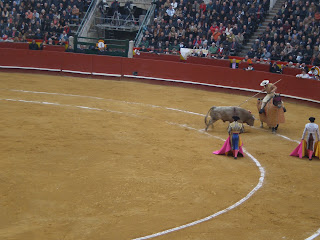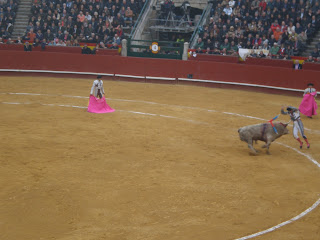This past weekend was the burning of the Fallas. We went to Valencia on Thursday to see the giant Fallas there and then we were in Denia for the actual burning on Friday night -> Saturday morning. The Fallas in Valencia were HUGE - easily double or triple the size of the ones in Denia.

This picture is of the Falla that won the competition in Valencia. It was NOT the Falla that spent the most money which was a big deal because it was a huge snub on the team that did spend the most money. There were so many people trying to see this Falla that there were times when we just had to stand in the crowd and look at it because no one could move. It felt a lot like being in the pictures that you see of Time Square at New Year's Eve.
We saw the giant statue of the Virgin Mary which t

hey decorate with flowers that each woman and girl brings to the Virgin during a giant parade in her honor. They had a smaller version in Denia with a parade on Friday which we also saw.
We also saw a mascelta, which is a fireworks/firecrackers show, except that in Spain, they focus way more on the noise than on the lights. It actually happened in the middle of the afternoon in the plaza in front of the city hall. At the beginning, it was just like being really close to a normal fireworks show, but at the end, the ground was shaking and the whole crowd was yelling. They used really big explosions that have a deeper sound than the sharp cracks that hurt your ears, so it was not painful at all, it just made your entire body shake. It was a huge adrenaline rush!

During the afternoon, we went to see a bullfight. It was fascinating, but it was also really bloody. The stadium was completely sold out and the crowd participated a lot in the fight. There were six bulls and three matadors, each of whom fought two bulls. Before anything started, there was an opening ceremony where the picadors, bandilleros, and matadors were presented to the crowd. There really is a lot of artistry and ceremony involved in a fight, and I can understand why Spaniards defend it as a cultural expression of the contest between man and nature. When a really strong, angry bull is charging at a man with nothing but a cape and a sword, there is terrible beauty in that. The sad part is when the bull is weaker and stumbles or when the matador is not very good and has does not kill the bull on the first try. Then you just feel like the bull is put in the ring for sport and does not stand a chance anyway.

The picadors are the hardest to watch for me because the bull butts up against the horse with a lot of force. The horse is protected by a really thick padding, but there were a few times when the horse almost fell because the bull was pushing on it so hard.

I actually think that the bandilleros are the most fascinating to watch because they do not have a cape which means that when they run at the bull to stick it with their spears, they are completely exposed. The matadors were interesting, but they were not very good.

Alright, they are closing school, so one picture of them burning the Falla in the last post, and then I'm off. I think that the most powerful thing about watching these was the heat. Standing in the front row usually meant that you had to back away from it about a minute after it caught fire.
 (the main meal of the day – think Sunday dinner) at a little restaurant south of the city and across the road from the beach.
(the main meal of the day – think Sunday dinner) at a little restaurant south of the city and across the road from the beach.  We had the whole restaurant to ourselves, and the food was delicious – salad, potatoes with bacalao, spinach bread, alioli, ribs with honey, veggies, fried potatoes, rice and, of course, cake.
We had the whole restaurant to ourselves, and the food was delicious – salad, potatoes with bacalao, spinach bread, alioli, ribs with honey, veggies, fried potatoes, rice and, of course, cake.  I have included a bunch of pictures of my family. The first one is of my Mama and Papa and their daughter, Maria Sue giving Papa a kiss. The second one is of all of their grandchildren (and me...). The third one is with their five kids, and the fourth one is with all of their children-in-law. My Mama's neice, her two grown sons and the girlfriend of one of the sons also came. Fortunately, I had already met most of the family - all of the children, in-laws, and most of the grandkids, so I only had to meet the neice, her family, and the boyfriends of some of the granddaughters, which meant that I didn't have any trouble with names or getting people confused, which was nice.
I have included a bunch of pictures of my family. The first one is of my Mama and Papa and their daughter, Maria Sue giving Papa a kiss. The second one is of all of their grandchildren (and me...). The third one is with their five kids, and the fourth one is with all of their children-in-law. My Mama's neice, her two grown sons and the girlfriend of one of the sons also came. Fortunately, I had already met most of the family - all of the children, in-laws, and most of the grandkids, so I only had to meet the neice, her family, and the boyfriends of some of the granddaughters, which meant that I didn't have any trouble with names or getting people confused, which was nice.











